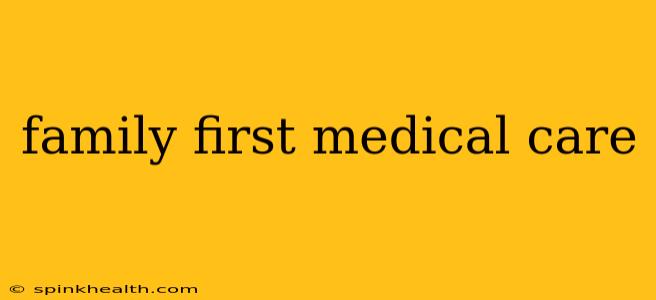Choosing a healthcare provider for your family is a significant decision. You want a practice that prioritizes not just medical needs, but also the well-being of your entire family unit. This is where the concept of "family first medical care" comes into play – a philosophy that moves beyond simply treating individual ailments to fostering a comprehensive approach to health and wellness for every member, from the youngest child to the oldest grandparent.
This isn't just about convenient scheduling or a friendly atmosphere (though those are important!). Family first medical care represents a fundamental shift in how healthcare is delivered, placing the family unit at the heart of the care plan. Let's delve deeper into what truly defines this approach.
What is Family First Medical Care?
Family first medical care encompasses a philosophy where the entire family is considered as a single unit within the healthcare system. This approach goes beyond treating individual symptoms. It focuses on:
-
Preventive Care: Regular check-ups, vaccinations, and screenings are crucial for maintaining overall family health. This proactive approach helps identify potential issues early, often preventing more serious problems down the line.
-
Holistic Wellness: It takes into account the physical, mental, and emotional well-being of each family member. This includes considering lifestyle factors such as diet, exercise, stress management, and sleep patterns.
-
Personalized Care: Recognizing that each family is unique, family first medical care tailors treatment plans to fit individual needs and circumstances. This might involve coordinating care for multiple family members with different health conditions.
-
Strong Physician-Patient Relationship: Building trust and open communication between the healthcare provider and the family is vital. This fosters a collaborative partnership where families feel comfortable discussing concerns and participating in their care decisions.
-
Coordination of Care: Managing multiple appointments, specialists, and medications can be challenging. Family first medical care often helps coordinate this process, simplifying care for the family.
What are the Benefits of Family First Medical Care?
The advantages of choosing a practice dedicated to family first medical care are numerous:
-
Improved Communication: Open communication between the doctor and the entire family leads to better understanding of health issues and treatment plans.
-
Improved Health Outcomes: Proactive care and a holistic approach often lead to better overall health and fewer complications.
-
Increased Family Well-being: Focusing on the whole family's health fosters stronger family bonds and a more supportive environment.
-
Reduced Stress: Having a single point of contact for all family healthcare needs simplifies management and reduces stress for busy parents.
-
Better Long-Term Health Management: Chronic conditions can be managed more effectively through collaborative care planning.
How to Find a Family First Medical Care Provider?
Finding the right provider is key. Consider the following factors:
-
Doctor's Philosophy: Look for a practice that explicitly states its commitment to family-centered care.
-
Patient Reviews: Read online reviews to get a sense of other families' experiences.
-
Services Offered: Ensure the practice offers a range of services relevant to your family's needs, including preventive care, vaccinations, and chronic disease management.
-
Accessibility and Convenience: Consider location, appointment scheduling, and availability of telehealth options.
What services do Family First Medical practices typically offer?
A family first medical practice usually offers a comprehensive suite of services tailored to the needs of all family members, spanning across various ages and health conditions. This could include:
-
Well-child exams and vaccinations: Regular check-ups for children to monitor their growth and development, administer necessary vaccines, and address any health concerns.
-
Adult preventative care: Screenings for common conditions like high blood pressure, high cholesterol, and diabetes, along with personalized health recommendations.
-
Chronic disease management: Support for individuals with conditions like asthma, diabetes, or heart disease, providing guidance on medication management, lifestyle modifications, and regular monitoring.
-
Women's health services: Annual gynecological exams, prenatal care, and family planning services.
-
Mental health support: Access to counseling or referral to mental health specialists, addressing issues like anxiety, depression, or stress.
-
Telehealth options: Remote consultations for added convenience and accessibility.
Are there any drawbacks to family first medical care?
While family first medical care offers significant advantages, it's important to acknowledge potential drawbacks:
-
Longer Appointment Times: The holistic approach might lead to longer appointment times compared to traditional practices focused solely on specific symptoms.
-
Limited Specialist Access: Depending on the size and resources of the practice, access to specialists might require referrals to external providers.
-
Higher Costs (Potentially): The comprehensive nature of family first medical care may potentially result in higher overall costs, though this isn't always the case.
Choosing a family first medical care provider is a step towards building a stronger, healthier family. It is an investment in proactive healthcare and a long-term commitment to overall well-being for everyone you cherish. Remember to do your research, ask questions, and find the practice that best aligns with your family's unique needs and values.

